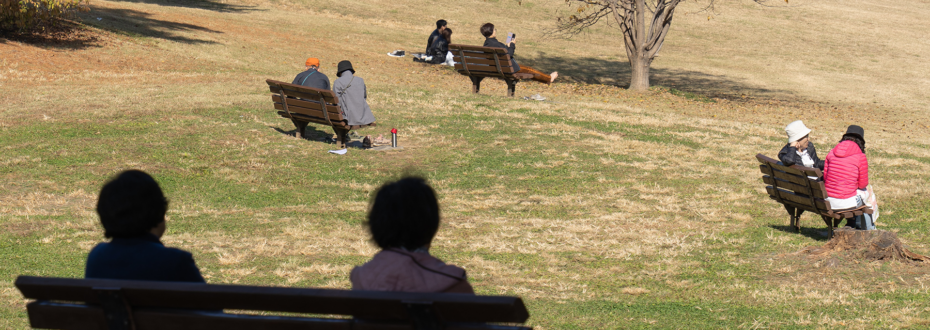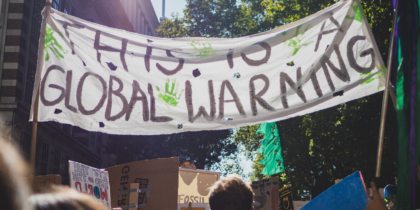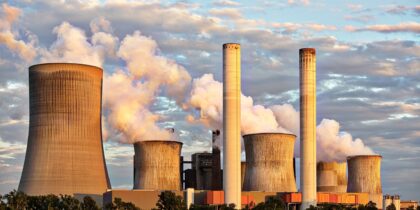By Frederico Cardoso and Nick Treloar
Centre for Mental Health’s final Festival of Ideas 2023 event focused on the intersection between climate change and mental health. Our three panellists, Elliot Busari, Professor Piran White, and Agnes Agyepong, as well as the chair, Dr Pete Coventry, brought lived (and living) experience and deep knowledge of the impacts of the climate crisis on mental health to the debate, with many years’ worth of knowledge gleaned from using services, working with them, and carrying out research to bring about systemic change.
Pete introduced the event by explaining the impacts of the climate crisis on mental health and why it is so important for us to talk more about this intersecting topic. The Lancet countdown on climate change and health, for example, only tangentially mentioned the impacts on mental health. And while domestic car use contributes to about 50% of the total emissions produced by transport in the UK (and transport accounts for 24% of total CO2 emissions in the UK), the impacts on mental health are poorly researched. We’ve shared some of the key themes and ideas from the event.
Climate change is a racial justice and social justice emergency
Exploring the relationship between the air we breathe and our health outcomes is of critical importance. Agnes Agyepong, CEO of Global Black Maternal Health, outlined how air pollution and climate change intersect with maternal (and wider) mental health. For example, people of colour are more likely to be breathing in toxic air but less likely to be contributing to those toxic levels. And research shows that those exposed to the worst air pollution are more likely to be deprived Londoners and from racialised communities.
Climate change is exacerbating health disparities and taking a psychological toll. On top of the physical and psychological impacts, it is also causing stress, anxiety, burnout and ‘advocacy fatigue’, as people feel helpless to change these conditions.
While growing awareness is needed, this means uncovering another layer of injustice, which in turn leads to increased trauma and intergenerational impacts.
What, then, are some of the solutions? Agnes pointed to improving education and awareness of climate change’s effects; fostering greater community resilience; advocating for equitable policies; and developing culturally competent care.
Nature fuels creativity and boosts mental health – so everyone needs access to it
Elliot Busari, an aspiring clinician and one of our Young Changemakers, explained how he makes change happen through the arts, capturing complex ideas and reimagining them in a way that allows them to be felt as well as understood. (Check out his poem for our RHS Chelsea Flower Show project as a great example of this!) In this context, he considered how environmental impacts and the injustices experienced by certain communities can be translated into change.
Exposure to nature positively impacts creativity, so ensuring that all communities have equal access to natural environments is key to making change happen. Environmental injustice means that 40% of people from minoritised backgrounds live in the most green-deprived spaces, thus negatively impacting their mental health and their creativity.
Elliot highlighted that investing in a greener future encourages hope and instils in young people a sense that their futures are worth fighting for.
The physical and mental health impacts of the climate crisis are intertwined – and we’re already seeing the effects globally
Professor Piran White (University of York) outlined that, while the initial impacts of climate change may be physical, the mental toll should not be underestimated.
The impacts of flooding worldwide are being more and more keenly felt. Being exposed to floods leaves enduring impacts on mental health, with people who have experienced flooding being nine times more likely to experience a long-term mental health problem. Flooding also impacts people’s social relationships and they often become more stressful.
Climate change is making floods and droughts more extreme and this means that people’s normal coping mechanisms for dealing with floods are no longer working. For people living in coastal areas who rely on fishing to live, this is being very keenly felt. In Colombia, India and Bangladesh, for example, this is already a huge issue.
Piran explained the need to sensitise governments and services to take more and direct action here. For example, nature-based solutions are a good starting point. In the UK, this includes planting more trees and creating natural dams. This can improve wellbeing by improving access to natural areas for people.
Question and answer
Our panel answered lots of brilliant questions put forward by delegates, but we’ve taken the opportunity to address some of the remaining questions below.
Interesting to hear about the MH impacts of flooding, I see similarities with this and the impacts of trauma in the asylum-seeking and refugee community, many of whom may be displaced due to the climate crisis. When environmental events impact our homes there is a really acute impact. What are some thoughts/experiences on how to engage with refugee and asylum seeking communities on the climate crisis, particularly from a mental health perspective?
A culturally- and trauma-informed approach to working with refugees and asylum-seekers around the climate crisis is critical. This is particularly important from a mental health perspective, and in the context of the climate emergency, in light of the trauma many climate-driven refugees and asylum seekers have experienced. Support and engagement should be coproduced with refugees and asylum-seeking communities, in collaboration with grassroots organisations and community leaders.
I am seeing more ‘climate change therapists’ / ‘climate-awareness therapists’. Will there be a greater drive in developing this at all levels across the world and also in other minoritised communities? We will need people of colour represented and to also have these therapists being able to reach rural areas also. So where do you see these therapists going, if they are? What are you seeing on this front?
The psychological impacts of the climate crisis, and the increasing recognition around these, are the main driver of the emergence of “climate change/awareness therapy”. This is increasingly leading therapists to expand and develop their practices, to address issues such as eco-anxiety and other existential concerns. With the increase in magnitude and frequency of extreme ecological events, along with the general deterioration of living conditions for most people, it is likely that demand for these services will increase. Provision could extend beyond individual therapy to community workshops, support groups, and educational initiatives, in an attempt to provide individuals with tools to navigate their anxieties and fears. Given the disproportionate impacts of the climate crisis, the development and provision of climate-aware therapy should especially consider the needs of marginalised and racialised communities who will be most affected, along with people living in rural and underserved areas who might face additional barriers in accessing mental health support. Only then can climate-change therapeutic practices develop in a just and equitable way.
Between regulation and technology, what do you think will have the greatest impact on climate change mitigation?
In the realm of the climate crisis, particularly around mitigation efforts, regulation and technology are inextricably linked in a complex dynamic. From a historical perspective, technological developments have enabled the temporary alleviation of several ecological challenges in the past, from artificial fertilisers enabling unsustainable agricultural practices, to the advent of increasingly brutal fishing methods to make up for overfishing practices. The possibilities created by new technological advances often replicate a recurring theme: the postponement of addressing the underlying structural issues. We need to question whether our reliance on technological fixes is deferring – or hampering altogether – the necessary deeper shifts in socioeconomic systems.
Check out our Festival of Ideas event series – watch all events here.







